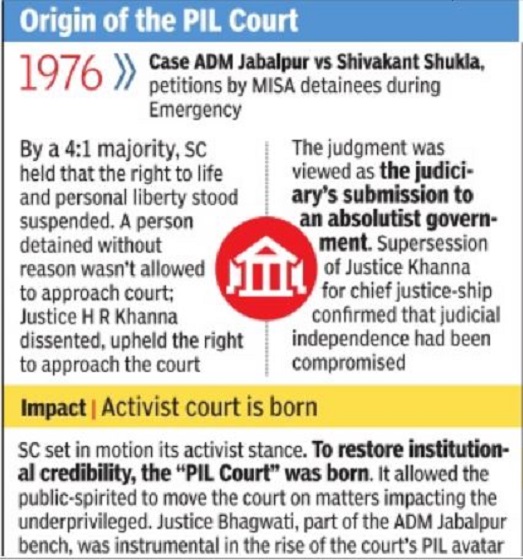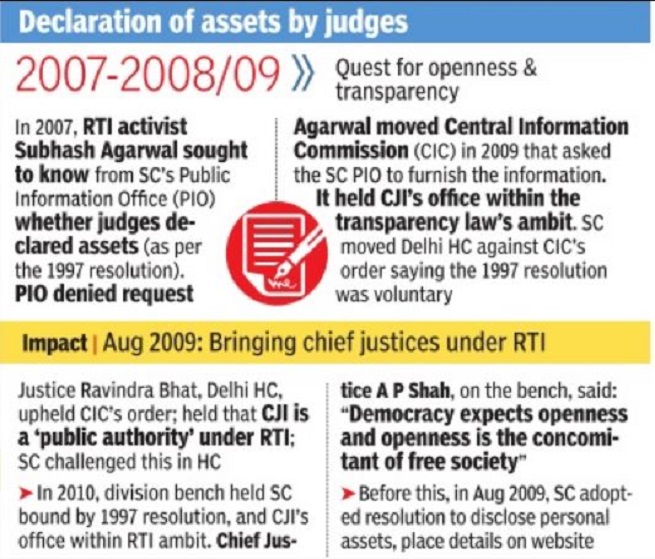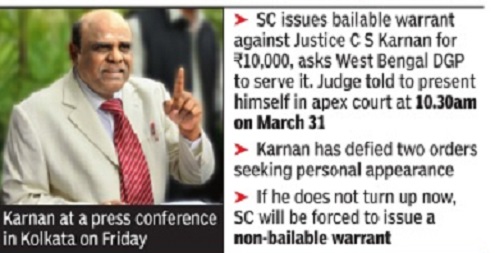Judiciary, superior: India
(→High Court judgments) |
(→SC orders warrant against sitting HC judge) |
||
| Line 46: | Line 46: | ||
The apex court will have no option but to issue a nonbailable warrant against Karnan if he fails to appear on March 31. | The apex court will have no option but to issue a nonbailable warrant against Karnan if he fails to appear on March 31. | ||
| + | ===Justice Karnan orders cases against CJI, SC judges=== | ||
| + | [http://epaperbeta.timesofindia.com/Article.aspx?eid=31808&articlexml=Karnan-orders-cases-against-CJI-SC-judges-11032017001072 Karnan orders cases against CJI, SC judges Mar 11 2017 : The Times of India (Delhi)] | ||
| + | |||
| + | |||
| + | Karnan orders cases against CJI, SC judges | ||
| + | |||
| + | |||
| + | Calcutta HC judge C S Karnan held a “court“ session at his residence within hours of the SC issuing a bailable warrant and “ordered“ that a case be registered under the SCST Act against CJI J S Khehar, other SC judges on the bench and AG Mukul Rohatgi. He also issued an “order“ directing the CBI to register and investigate cases against a host of judges from various courts for alleged corruption, rape and embezzlement. | ||
=High Court judgments= | =High Court judgments= | ||
Revision as of 09:31, 11 March 2017
This is a collection of articles archived for the excellence of their content. Readers will be able to edit existing articles and post new articles directly |

The Times of India

The Times of India
Contents |
Disciplinary issues
SC orders warrant against sitting HC judge
Court Rejects Karnan's Plea To Meet CJI
The Supreme Court took a stern view on Friday of Calcutta high court judge C S Karnan defying its direction to present himself in court and, in an unprecedented decision, issued a bailable warrant aga inst the serving judge. Karnan's presence is required in the SC as he is facing contempt proceedings for levelling allegations against the SC and his former colleagues in the Madras high court.
The court rejected a request from Karnan to meet the Chief Justice and senior judges of the SC, noting that it could not be treated as a response to the notice issued to him. It also saw reports that the judge was passing orders from his house as a “prank“.
A seven-judge bench hea ded by Chief Justice J S Khehar decided it had had eno ugh of Karnan's defiant ways and acted tough as he refused to comply with two SC orders seeking his personal appearance despite a notice being served on him.
The court said it was left with no option but to issue a warrant against him to secure his presence in the court on the next date of hearing on March 31. This is the first time that a sitting judge of the higher judiciary is facing contempt proceedings and the apex court has been forced to issue a warrant against a judge. Karnan has consistently claimed that he is a victim of caste bias and ac cused his colleagues of discriminating against him. He has claimed that the proceedings against him are vitiated by the same sentiment.
Attorney general Mukul Rohatgi told the bench, also including Justices Dipak Misra, J Chelameswar, Ranjan Gogoi, Madan B Lokur, P C Ghose and Kurian Joseph, that Karnan had refused to mend his ways and there is no let-up in his contemptuous behaviour as he recently passed an order against the SC order on the “suicide note“ of former Arunachal Pradesh chief minister Kalikho Pul in which allegations were levelled against certain judges.
The AG said he had talked to the registrar general of the Calcutta high court, who confirmed that the order was passed by Karnan at his home but it was not sent to HC.
The bench, however, refused to take note of the incident, saying it might be a “prank“, but decided to lean on the judge. It issued a bailable warrant on a personal bond of Rs 10,000 and asked the West Bengal DGP to serve it to the judge.
The CJI said that Karnan had sought a meeting with him and fellow judges to dis cuss the allegations levelled by him but it could not be accepted as his response to the court's notice.
“It would be pertinent to mention that the registry of this court received a fax message from Justice C S Karnan, dated March 8, seeking a meeting with the Chief Justice and the judges of this court, so as to discuss certain administrative issues expressed therein, which primarily seem to reflect the allegations levelled by him against certain named judges. The above fax message cannot be considered as a response of Justice Karnan, either to the contempt petition, or to the notice served upon him,“ the bench said.
“In view of the above, there is no other alternative but to seek the presence of Justice C S Karnan by issuing bailable warrants. Ordered accordingly . Bailable warrants in the sum of Rs 10,000 in the nature of a personal bond to the satisfaction of the arresting officer be issued to ensure the presence of Justice Karnan in this court on March 31 at 10.30am,“ the bench said in its order after holding a brief 15-minute hearing.
The apex court will have no option but to issue a nonbailable warrant against Karnan if he fails to appear on March 31.
Justice Karnan orders cases against CJI, SC judges
Karnan orders cases against CJI, SC judges Mar 11 2017 : The Times of India (Delhi)
Karnan orders cases against CJI, SC judges
Calcutta HC judge C S Karnan held a “court“ session at his residence within hours of the SC issuing a bailable warrant and “ordered“ that a case be registered under the SCST Act against CJI J S Khehar, other SC judges on the bench and AG Mukul Rohatgi. He also issued an “order“ directing the CBI to register and investigate cases against a host of judges from various courts for alleged corruption, rape and embezzlement.
High Court judgments
Karnataka: Quashing circulars issued by CJ
From the archives of The Times of India 2010
HC quashes three circulars issued by CJ Dinakaran
Karnataka HC has struck down three circulars issued by its Chief Justice P D Dinakaran against whom allegations of land-grabbing have been raised. The first circular that was quashed by a division bench, comprising Justice N Kumar and Justice Srinivasagowda yesterday, concerned the Chief Justice’s power to hear cases filed by employees of high court and judicial officers against his administrative decisions.
The second circular that was struck down related to the sitting Chief Justice’s jurisdiction in deciding which circuit bench should hear a particular case.
The judgement paves the way for litigants in north Karnataka to approach the principal bench directly, which they could not do earlier. According to the first circular, cases by court employees and judicial officers challenging the Chief Jutice’s orders were posted to hall one, where the CJ sits.
Allowing a petition filed by M S Poojari, a peon in the high court, the court said the circular cleared the way for CJ to be a judge in a case where he is also the litigant.
Calcutta: Judge changes mind, and order
The Times of India, June 8, 2016
Subrata Chattora Calcutta high court was witness to a wrangling match between two judges in the courtroom perhaps never seen since its inception in 1862.The spat was over a change made in the order delivered earlier in open court by one of the judges. The senior judge of the division bench even offered to resign after coming to know about the alteration, saying that making such changes without informing him was illegal. A division bench of justice Ashim Kumar Roy and C SKarnan had on May 20 turned down the bail petitions moved by IVRCL senior general manager Mallikarjun Rao and nine others accused in the Vivekananda Flyover collapse case. They have been in jail since April 1after being remanded by a lower court. Justice Karnan had a change of mind more than a fortnight after he had agreed with his senior, Justice Roy, in turning down the bail appli cation. According to Justice Roy , the other judge retired to his chamber on Monday afternoon without taking leave from his senior and made amends to the bail rejection order. While striking off his agreement, Justice Karnan took a contrary stance and held that all of the accused should be granted bail.
The senior judge lost his calm when he got to know about the change. On Tuesday , Justice Roy stopped in front of the judge's seat and asked Justice Karnan to sit first. “You take the seat first because you broke decorum yesterday by leaving the courtroom,“ Justice Roy said.
Justice Karnan was courteous and requested the senior to take seat. “Please take your seat first,“ he said. According HC sources, Justice Roy later called on Chief Justice Manjula Chellur and told her about the incident.
Meghalaya: Sr lawyer tag for former CJs, judges
Dhananjay Mahapatra, Sr lawyer tag for former CJs, judges, Sep 13 2016 : The Times of India
Meghalaya HC's Controversial Ex-CJ Uma Nath Singh Leads SC List Of 26
Even as senior advocate Indira Jaising's petition questioning the rationale behind designating some lawyers as senior advocates in April last year remains pending, the Supreme Court on Monday said it had designated 26 former chief justices and judges of high courts as senior advocates.
First on the list of freshly designated senior advocates is former Meghalaya HC chief justice Uma Nath Singh.There are two petitions pending in the SC challenging decisions of the HC headed by Justice Singh.
The first petition by Shillong Bar Association questioned the rationale behind a decision by the Meghalaya HC headed by Justice Singh to designate Delhi-based la wyers as senior advocates.The SC entertained this petition in January and issued a notice to the Meghalaya HC registrar general.
The second petition by a common man from Meghalaya challenged the retirementeve orders by a bench headed by Justice Singh, directing the state to provide him with `Z' category security even after retirement and treat him as a guest of the state whenever he visited Delhi and Shillong. The SC has kept this petition in abeyance after Meg halaya said it would challenge these orders.
Former judges of Allahabad HC -Satish Chandra, Ravindra Singh, Sunil Hali and Virendra Vikram Singh -were designated as seniors at the SC's full court meeting on August 31.
Other retired judges to get the senior advocate tag are Asim K Banerjee (Calcutta HC), K C Bhanu and P Chandra Kumar (AP and Telangana HC), Anil Kumar, Kailash Gambhir and J M Malik (Delhi HC), Subhash Chandra Jha, Dharnidhar Jha and V N Sinha (Patna HC), K C Puri, Arvind Kumar, B B Parsoon and S D Anand (Punjab and Haryana HC), B D Rathi and Sambhoo Singh (MP HC), Kamal Mehta (Gujarat HC), A K Rajan (Madras HC), Hasnnain Massodi (J&K HC), V R Kingaonkar (Bombay HC) and I M Quddushi (Chhattisgarh HC).
The SC did not designate a single lawyer as senior advocate since its decision on April 23 last year was challenged by Indira Jaising, the first woman additional solicitor general who represented the government during the UPA regime. The SC had entertained her petition in July last year .
The court had said, “We are aware of the problem. All is not well. But let us assure you that there is no intention to deny a deserving candidate or confer it on an undeserving lawyer.“ It had explained why the SC had changed the procedure for designating a lawyer as senior advocate from open house to secret ballot in 2014.
“There were times when judges found it difficult to object to some names. So, it was felt that they could express themselves without reservation through secret ballot,“ it had said.
Jaising had said, “There is no criteria laid down for determining excellence in advocacy and no rational nexus between the persons designated and their excellence or no rational reason for rejection of persons of eminence and ability .
“This has resulted in denial of designation of those advocates who have domain expertise in matter such as PIL, human rights, family law, international law and other specialised subjects.“
Judges' security
Meghalaya CJ, Laloo cases
The Times of India, Sep 06 2016
Dhananjay Mahapatra
Aam aadmi has no say in ex-judges' security, says SC
After evaluating the threat perception of former Meghalaya high court chief justice Umanath Singh, central security agencies found no perceptible security threat to him, who in his last days as CJ had suo motu ordered `Z' category cover for himself even after retirement. Three orders passed in December and January by an HC bench headed by Singh was challenged by a common man, Sajay Laloo, in the Supreme Court, which has openly expressed dislike towards common citizens questioning security for retired judges.
During the last hearing, an SC bench headed by Chief Justice of India T S Thakur had virtually stopped Laloo's counsel, senior advocate Vijay Hansaria, from arguing the matter. It had asked central agencies to evaluate the threat perception of the retired CJ and send the inputs to the Meghalaya government.
Central agencies told the state that incidents cited by the former CJ as cause for apprehension to his security were not serious, indicating that there was no need for `Z' category security cover. In between, Meghalaya's counsel Ranjan Mukherjee had requested the court for in-chamber hearing of the issue because of its sensitivity . This was stridently opposed by Hansaria.
Hansaria had barely started arguments that the bench headed by Thakur snapped at him and asked him to sit down. “This is a matter between the judiciary and the Meghalaya government. A common man has no say in this,“ the bench said.
Though slighted by the bench, an unfazed Hansaria questioned the bench's perception about a common man's locus standi in questioning unreasonable orders passed suo motu by an HC bench.
But the bench told him to “sit down“ and clarified it would hear only the Centre and Meghalaya. Hansaria walked out of the court saying, “If that is the case, then I would rather go out. Let the court decide what it wants.“
Additional solicitor general Maninder Singh told the court that central agencies had evaluated the security requirement of the ex-CJ and sent the inputs to the state.
The bench, which was initially inviting the counsel for a chamber hearing, chided the Meghalaya government for not challenging such orders and, thus, giving an opening to “interlopers“ to jump into the fray with PILs.
“Stand upfront and say these are wrong orders and challenge them in the Supreme Court. Because the state government did not challenge these orders, it has given fodder to the common man to challenge it in the SC,“ the bench said. Meghalaya's counsel assured the court that the state would challenge the orders within three weeks.
Number of women judges in the Supreme Court and High Courts
Please see graphic

House panel slams SC, HCs for monitoring CBI probes
The Times of India, Dec 09 2015
Neeraj Chauhan
House panel slams SC, HCs for monitoring CBI probes
Courts Are Overstepping Their Brief
In a significant remark on the judiciary's intervention in CBI investigations, a parliamentary committee has stated that the Supreme Court and high courts have started performing the functions of the lowest rung of criminal justice system, taking over the role of a magistrate. Asserting that superior courts are working beyond their powers, the parliamentary standing committee on personnel, public grievances, law and justice said, “The superior courts which are courts of appeal under Sec tion 374 of the Code of Criminal Procedure (1973) are even directing CBI in a number of cases to report day-to-day progress in a sealed cover bypassing sections 172 and 173 of the CrPC and performing functions envisaged under the criminal justice system of the country for the lowest rung of criminal courts and also appreciating the evidence which under section 173 of CrPC is required to be done by the magistrate.“
The panel's observations come at a time when most of the big-ticket CBI cases, including 2G spectrum allocation scam, coal block allocation scam, Vyapam scam, Virbhadra Singh corruption probe and ponzi schemes like Saradha, are being either monitored or regularly heard by the Supreme Court and several high courts. In fact, in the 2G and coal scams, the Supreme Court restricted all other courts to entertain any application against orders passed by the trial court.
The committee said, “...various high courts and Supreme Court are frequently issuing directions to the CBI to handle cases relating to Prevention of Corruption Act, 1988, as also of `public order'. As a result, the jurisdiction and powers of the CBI have widened and deepened and have far exceeded than what was contemplated under the Delhi Special Police Act, 1946.“
The committee, headed by E M Sudarsana Natchiappan, points to “judicial activism of higher judiciary by taking pains of overseeing an investigation and passing interim directions to the CBI and even preempting the rights and remedies available to affected persons under criminal justice system. It may , therefore, appear to affected persons as a pre-emptive and colourable exercise of power by the superior courts“.
See also
Supreme Court: India (mainly SC's rulings)
Supreme Court, India: Administrative issues
Supreme Court: India: Chief Justices
Supreme Court: India: Sitting judges
Judicial appointments, senior: India mainly the Collegium debate
Judiciary: India (powers, functions)
Judiciary, superior: India
